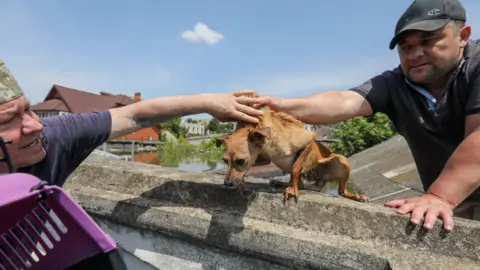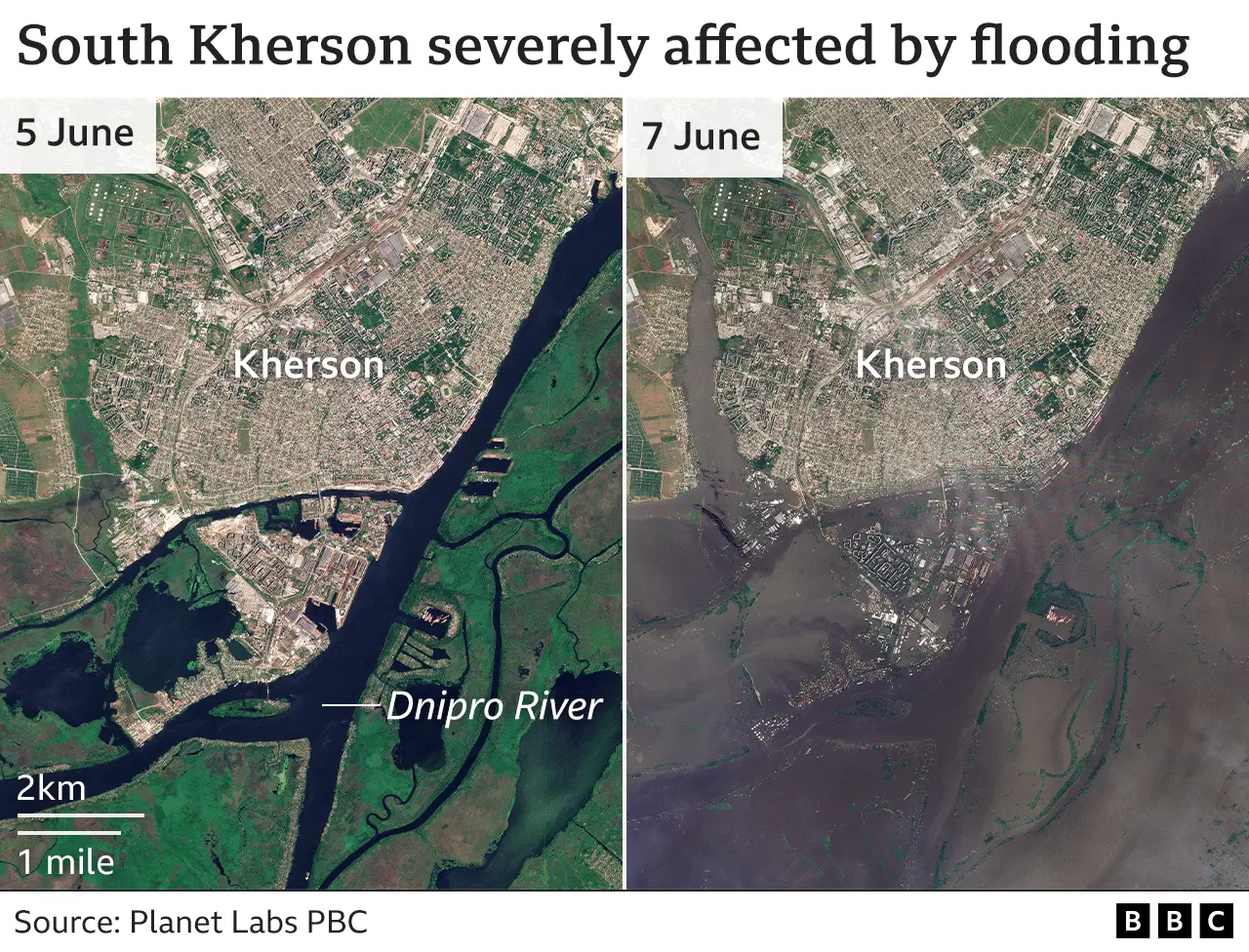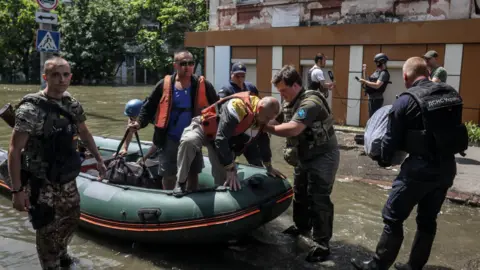Ukraine dam: Dislodged mines a major concern as residents flee Kherson
The breaching of a major dam in southern Ukraine will have a catastrophic effect on locating landmines, the Red Cross has warned.
Thousands of people have already been evacuated from parts of the Kherson region as water continues to surge down the Dnipro river which divides Russian and Ukrainian-controlled territory.
Both Ukraine and Russia blame each other for sabotaging the Kakhovka dam.
Three flood-related deaths have been reported in the Russian-held Oleshky.
Yevhen Ryshchuk, the town's exiled Ukrainian mayor, told public broadcaster Suspilne he believed there would be more casualties.
The BBC has been unable to verify claims by Ukrainian and Russian officials.
President Volodymyr Zelensky has visited the flood-hit region of Kherson where he said the priority was to "protect lives and help people as much as possible".
During his visit on Thursday, the Ukrainian leader also went to a medical facility and met people evacuated from the region.
The president earlier appealed for international effort to help people and accused agencies of failing to help, including the UN.
Erik Tollefsen, head of the Red Cross's weapon contamination unit, warned dislodged mines had sparked major concerns not just for Kherson residents, but also those coming to help.
"We knew where the hazards were," he told AFP news agency. "Now we don't know.
"All we know is that they are somewhere downstream."
Nataliya Humeniuk, a spokeswoman for Ukraine's military South Command, told Ukrainian TV: "Many anti-infantry mines [in Russian-seized areas] have been dislodged, becoming floating mines.
"They pose a great danger," she said, explaining that they were likely to explode if they collided or hit debris.
 Reuters
ReutersThe dam in Russian-controlled Nova Kakhovka was breached in the early hours of Tuesday, leading to mass evacuations as water levels downstream rapidly increased.
Officials say 30 towns and villages along the river have been flooded and nearly 2,000 homes have been submerged in the city of Kherson - the region's capital controlled by Ukraine.
One woman, who arrived in Kherson on a rescue boat from the Russian-occupied east side of the river, explained how quickly the situation escalated after she heard about the disaster early on Tuesday.
"We managed to collect our things but the water kept rising. At that moment I was cooking buckwheat and my feet were already underwater. It started to flood really fast," Kateryna Krupych, 40, told the BBC.
"It feels like we lived a whole life in just one day."
Interior Minister Ihor Klymenko said the Ukrainians are developing a plan to help people on both sides of the Dnipro river.
"We are saving everyone on the right [Ukrainian-controlled] bank and developing a plan to help people on the [Russian-held] left bank."

Of the 30 flooded towns and villages, 20 were controlled by Ukraine and 10 were temporarily occupied by Russia, he said.
Mr Klymenko also accused the Russians of leaving "people to fend for themselves".
Rising water levels were expected to peak in Kherson late on Wednesday, but officials fear a catastrophic impact on agriculture as the vast Kakhovka reservoir - upstream of the dam - empties into the Black Sea.
Kherson's regional head Oleksandr Prokudin said 1,700 have so far been evacuated while Kremlin-installed officials on the other side of the river say 1,200 people have been taken to safety.
Officials say more than 40,000 people - 17,000 in Ukraine-held territory west of the Dnipro and 25,000 in the Russian-occupied east - need to leave.
Unicef's Damian Rance said the charity has seen homes completely destroyed as concerns continue to linger around trapped residents.
"Safe water has been impacted in many of these locations as the water supply obviously came from the reservoir there, as has the electricity supplies that have been cut off."
 Reuters
ReutersPresident Zelensky said earlier on Wednesday that hundreds of thousands of people across the Kherson region were without drinking water.
Both sides blame each other for the destruction of the dam.
Ukraine says it was mined by Russian forces, and accuses Russia of doing little to help people in flooded areas of the Russian-occupied east bank of the river.
America's Democratic Senator Bob Menendez, who chairs the upper chamber's influential Foreign Affairs Committee, told the BBC he was "not certain yet" that Russia was responsible for blowing up the dam.
"But then again the Russians have denied all the actions they've taken against critical infrastructure in Ukraine - and those actions we know have been taken by Russia," he added.
Russia says the damage was caused by Ukrainian shelling, and President Vladimir Putin it "a barbaric act" in a phone call with Turkish leader Recep Tayyip Erdogan.
This is just the latest difficulty to hit the city of Kherson. It was occupied by Russian forces soon after the war began last year, but liberated by Ukraine in November. Since then the city has been bombarded with shelling.
Viktoria Yeremenko, 57, told the BBC her house was destroyed in February and she moved to her son's apartment which has now been flooded.
"We managed to get out," she said. "There was panic, we had to leave quickly and grab the dogs. My brother is half paralysed too."
In recent years the Kakhovka dam has become a symbol of leverage between Kyiv and Moscow.
When Russia illegally annexed Crimea in 2014, Kyiv closed down the dam and cut off Ukraine's southern peninsula from a major water supply.
Then last year, invading Russian forces were accused by Ukraine of planting the dam with explosives, which the Kremlin denied.
